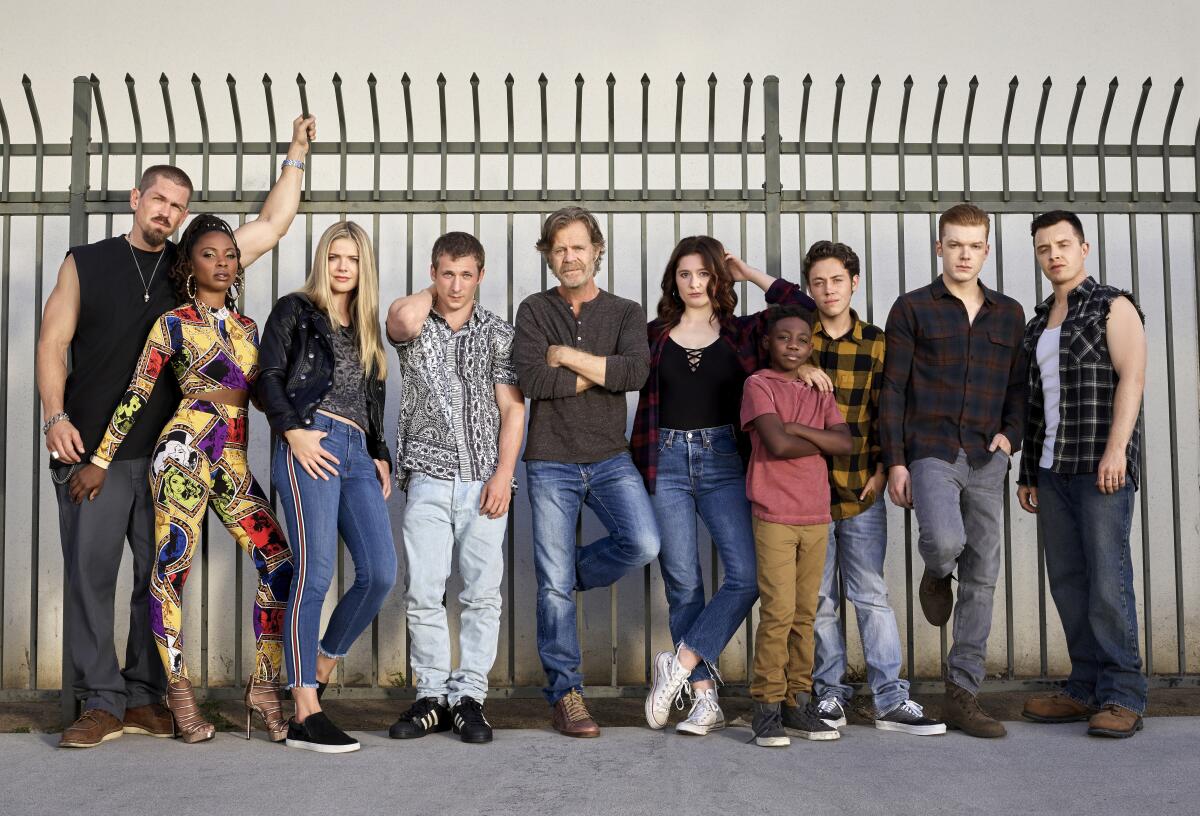After 11 seasons, it’s goodbye to the Gallaghers and the outrageous ‘Shameless’

At the end of Season 1 of Showtime’s “Shameless,” Frank — the drunken Gallagher patriarch, played by William H. Macy — stands outside his son Lip’s (Jeremy Allen White) bedroom window, apologizing for having slept with Lip’s girlfriend. “We’re both f—ing victims!” he cries, referring to himself and Lip.
In response, Lip urinates from his window onto Frank’s head. And after his initial disgust, Frank steps into the stream. They leave without another word — but smiling.
That was “Shameless,” which ended its 11-season run in April, becoming Showtime’s longest-running scripted series. It was a family show like no other: There was no bridge it wouldn’t burn to get a laugh or to make a point about families living on the edge of both poverty and civilized behavior.
“We satirized pretty much everything you can think of, often in bad taste,” says showrunner John Wells, who adapted it in tandem with a British version, both created by Paul Abbott based on stories about his own family. “But there was this wish fulfillment — this romance, that there’d always be a big sister to look after you or a brother that would step up for you, and that people would be in each other’s corner every time.”
‘Shameless’ star William H.
A sprawling ensemble of dysfunction, “Shameless’” extended cast largely focused on the large Chicago-based Gallagher family, members of which were lightly parented by its elder children, Lip and Fiona (Emmy Rossum, who left after the ninth season), because Frank was invariably drinking or drunk.
“He’s just shameless,” Macy told The Envelope in 2011. “A narcissist, a bad guy. A really rough character. He’s always scheming and plotting — he works at scamming the system, but he’s got joie de vivre. I love the guy.”
Frank’s likable unlikability made the show hard to watch at times, but Wells insists that “many of us have Franks in our lives. He reminded people of their uncle or their brother. Bill was always looking for challenges: In the [final episode], he was really in favor of having Frank die of COVID and never having a moment where he looks for sympathy.”
“Frank was like a cockroach,” says White. “There was something special about ending the show that way — but ending it without the rest of his family finding out [he was dead]. We could end on a high note.”
Still, this wasn’t a show that sold easily; Wells said it took seven years and four networks to land it at Showtime. “Other networks thought it went too far, but we loved how it took a tried-and-true concept — the family show — and turned it inside out,” says Gary Levine, president of entertainment at the channel. “Its outrageousness was grounded in a gritty reality — these were forgotten people at the margins.”
Along the way, though, the series did find out where Showtime would draw the line on questionable behavior, says Levine. “We encouraged them to go as far as they wanted to. But one time at a table read, I said to John and the writers, ‘You will not steal a library book. Gallaghers will rip off people, but they will not rip off the library.’ And they were aghast.”
Popular though it was, after five seasons “Shameless” might have been heading toward a finale … but a new wave of fans arrived, thanks to reruns on Netflix, which bounced them back to Showtime. By its seventh year, Wells says, they were boosting security around the Chicago location set, thanks to the appearance of fervent fans.
But the series took another hit when star Rossum decided to move on; she’d married “Mr. Robot” creator Sam Esmail, who was based in New York. And although it wasn’t a lethal blow, the writing was on the wall that “Shameless” would be coming to a close sooner rather than later.
“You don’t want to be a boxer that stays too long in the ring and gets clobbered,” says Levine. “We decided to let it go out on top.”
“I honestly didn’t think it would last very long,” admits Wells. “We were on a tightrope a lot, and many people felt we fell off it on many subjects. But that’s how black comedy is — some people are going to be offended. I think the audience understood, though, that we were not to be taken literally. It was worth having the conversation on some of these subjects.”
Meanwhile, several actors grew up during the show’s run — including Ethan Cutkosky (Carl), who started out at age 9. As he notes, he’d have been happy to go on with the series even longer. “We were so connected as a cast,” he says. “If Showtime had said, ‘We’ll do this for another 10 years,’ we’d have been down for that. We could have been telling stories for years to come.”
More to Read
From the Oscars to the Emmys.
Get the Envelope newsletter for exclusive awards season coverage, behind-the-scenes stories from the Envelope podcast and columnist Glenn Whipp’s must-read analysis.
You may occasionally receive promotional content from the Los Angeles Times.









